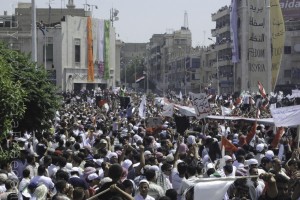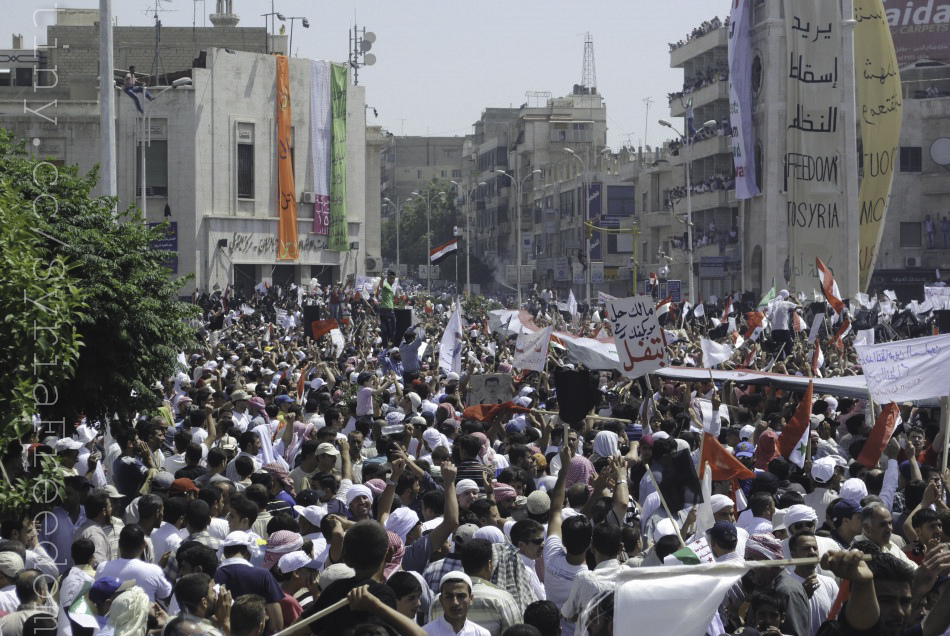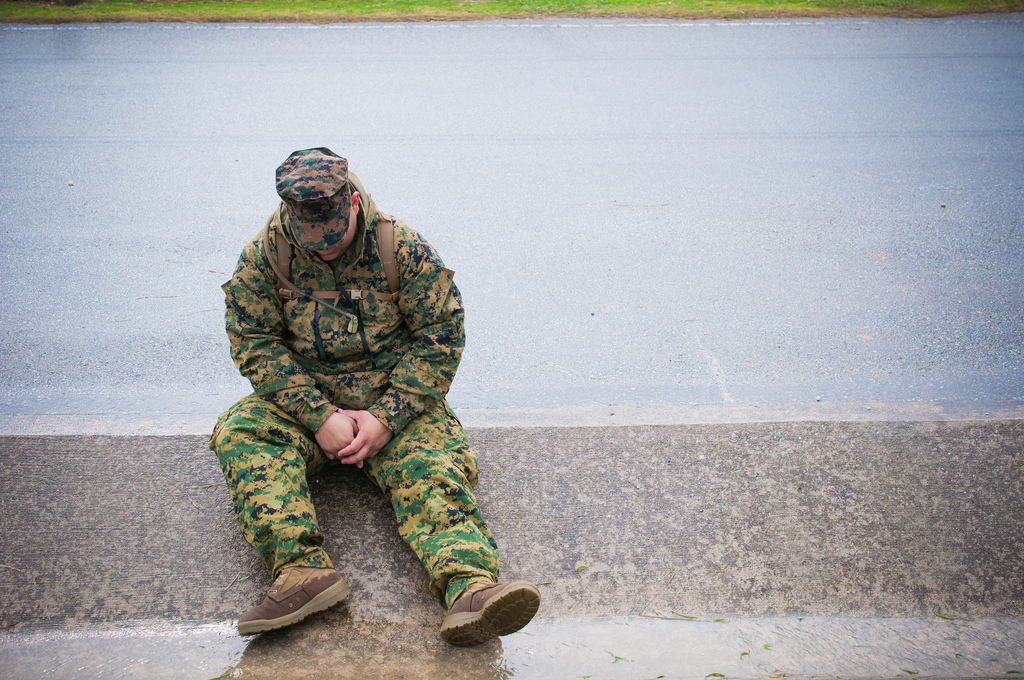
The deterioration of the human condition through violence mars history. Crimes such as slavery, forced deportation, and genocide have extinguished and defined populations. Unfortunately, crimes against humanity are not exclusive to ancestral pasts; humanity continuously faces grave challenges.
During the first ten days of December 2011, one thousand Syrians lost their lives to political persecution. This toll is viciously multiplying. A United Nations (UN) investigation report argues that, “the continuation of the crisis carries the risk of radicalizing the population, deepening inter-communal tensions and eroding the fabric of society.”
The Syrian crisis is an erosion of society that can lead to a civil war, a civil war that could shed blood that will stain the globe.
On February 4, 2012, Russia and China vetoed U.N. action on Syria. Other United Nations Security Council (UNSC) members are enraged by their lack of cooperation. “Those that have blocked potentially the last effort to resolve this peacefully … will have any future blood spill on their hands. The people of Syria have yet again been abandoned by this Council and by the international community,” said U.S. Ambassador Susan Rice.
Numerous members of the international community are ready to take a stance, to what many are calling a “systematic genocide by the Syrian government.” The UNSC must urgently establish unanimous consensus on how to “maintain international peace and security,” as prescribed by their mandate.
The UNSC is taking strides in consensus building with the appointment of Kofi Annan to Special Envoy to the Arab League, and endorsing his Six Point Peace plan last week. The plan has been signed by the al-Assad regime, yet the true intentions of implementation remain skeptical as the opposition groups continue to report brutal massacres.
The UNSC must be pressured to remain on this united front. By examining the current situation on the ground, past operations to quell internal unrest by international bodies, and the importance of the diplomatic consensus building, the call for the UNSC to act in the name of the Syrian people only grows.
//
Syrian President Bashar al-Assad is desperately defending his regime. After 48 years of emergency rule, the people of Syria are calling for reform, for an opportunity to be stakeholders of their own future. Syrian citizens have been taking to the streets for a year. The al-Assad regime labels the protestors as terrorists, a scapegoat to warrant the brutal military attacks against their cities and homes. But this label of terrorist is endorsed by few. To most of the world, these protestors are courageous defenders that deserve the support of the international community.
When the European Union and Turkey imposed sanctions on Syria’s leaders and freezes on its foreign assets, the Arab League also took a significant step and suspended Syria of its membership. The political and economic implications of the sanctions and suspension pressured al-Assad to allow Arab League monitors to enter the country under the purview of a peace plan. Yet, the violence did not cease. After the death of the executive director of Syrian Arab Red Crescent, several thousand more civilian causalities, and a retreat of the Free Syrian Army, the UNSC officially recommended al-Assad step down and allow the UN humanitarian chief into the country.
“Friends of Syria” is an international group composed of prominent leaders including the United States of America, Turkey, the European Union, the Arab League, and more than 60 other nations planning a civilian peacekeeping mission. During the group’s recent conference in Tunisia, President Barack Obama declared, “It is time to stop the killing of Syrian citizens by their own government,” from Washington, adding that it is “absolutely imperative for the international community to rally and send a clear message to President Assad that it is time for a transition. It is time for that regime to move on.”
President Obama made it clear that “every tool available” would be used to end the bloodshed in Syria. Yet, before the world’s military powers begin prepping a Libyan-style military intervention, the bargaining power of the United Nations and Arab League should be exhausted.
As the death toll climbs to 8,000, it is clear that a tight grip on the crisis is lost. It is a clear call for the UNSC to step up. The USNC must continue to take swift and decisive action for the innocent people of Syria. It must continue to effectively articulate to al-Assad the negative consequences of isolating itself from the world. The UN’s ability to protect Syria’s humanity is crucial to the stability of the Arab world and to the stability of the global community.
//
One may ask, why not simply emulate the successful military intervention of Libya against dictator Muammar Gaddafi?
The situation in Libya leading up to UN and NATO intervention was distinct from the current situation in Syria in a number of ways. Firstly, Syria’s military is stronger and better equipped than Gaddafi’s forces. A stronger military will undoubtedly lead to more casualties and collateral damage if foreign military intervention ensues or the opposition is equally, heavily armed.
Secondly, the regional impact of a Syrian intervention holds more consequences than the Libyan intervention did. Libya had very few friends in the Arab region, let alone the world. Its neighbors to the left and right underwent democratic revolutions; there was no tolerance for Gaddafi. However, Syria has a strong tie to Iran. If Iran were to use Syria as a proxy war against Israel, as it did with Iraq in the 1980s, the damage could be unbearable. Israel and Lebanon would certainly be destabilized by such intensification in regional hostilities.
Thirdly, there was global consensus for a Libya intervention. The UNSC clearly stated, “all measures necessary,” to protect civilians in Libya; whereas in Syria, the UNSC has yet to come to an agreement on the gravity of the situation. Russia insists that Syrian unrest does not pose a threat to global peace, and stepping in would breach international law.
To expect a replica scenario of the Libya intervention is irresponsible. As the Syrian protestors organize themselves, arm themselves, and prepare to defend themselves, full-fledged civil war is arguably the next news headline to expect. Arguments that arming the opposition, the civilian protestors, would only exacerbate that potential headline are a fair conjecture. Yet, an unfair conjecture is that the Syrian victims do not need international support, and that the violence can be exclusively resolved from within.
//
The United Nations General Assembly has the capability to handle some of the refugees emerging from embattled regions with the Arab League. The United Nations Security Council has the capability to handle stronger diplomatic negotiations with al-Assad with the Arab League.
Stronger coordination between the Arab League and the United Nations is a necessary next step forward. Arab League suspension of Syria should be a loud enough signal to all five veto-wielding UNSC members that the situation is grave and requires immediate action. When Qatar declares that a ceasefire is not enough in Syria and that those responsible must be held to account, the UNSC is pressured to demand secure aid channels, freed prisoners, in addition to a ceasefire from al-Assad. Essentially, the UNSC needs to catch up to the demands of the Arab League if they are going to uphold their mandate of maintaining international peace and security.
The role of the UNSC is only effective when it is a united front, untied it renders useless. One measure that the Council has finally agreed upon was assigning Former Secretary General Kofi Annan the position of special envoy to the Arab League to lead negotiation discussions. On March 27, 2012, Annan’s Six Point Plan to peace in Syria was signed by al-Assad. The plan calls for a U.N.-monitored stop to the violence, access for humanitarian aid workers, and an inclusive Syrian-led political transition to a democratic, multi-party political system. Implementation is key. Failure for any signing party to carry out the operative clauses of said agreement will result in the failure of liberating the Syrian people from the death and destruction they face.
Humanity is part of our foundation. Crimes against it cannot be tolerated. Engaging in violence to stop violence is unsustainable. The United Nations and its allies must engage their toughest diplomatic negotiators to end the atrocities in Syria, remain a united force, and prevent further destruction of human dignity.



